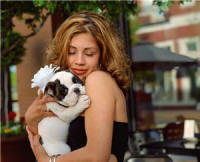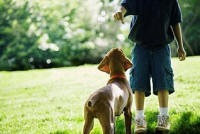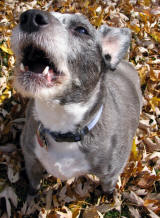|
Satisfying the
AAHA Behavior Requirements |
Veterinary Hospitals
participating in the Animal
Behavior Network (ABN) meet the
Behavior Requirements for the
American Animal Hospital
Association (AAHA).
What are AAHA and ABN?
PC57.
Behavior concerns are addressed through
routine counseling, client education
materials, and appropriate referral
to qualified veterinary behaviorists
or counselors.
Behavior
Consultation
Behavior Topics
PC58. The practice provides counseling
and education materials on the following
subjects:
a. Selection of an appropriate pet
Puppy
Selection Program
Test
for Selecting a New Dog - 1 page summary
Test
for Selecting a New Dog - Expanded
Test
for Selecting a Dog While Visiting a
Shelter
Test
for Selecting a New Cat
Test
for Selecting a Cat While Visiting a
Shelter
b. Proper housing
Kennel
Training-One Page
d. Socialization
Puppy
Socialization Checklist
Feline
Kitten Socialization Q&A
Socialization
and Obedience Class
Early Socialization
e. Housetraining
Canine
Elimination Training - Basics
Elimination
Training
Elimination Training Resistant Dogs
f. Litter box management
Feline
Litterbox Training Q&A
Feline
Inappropriate Elimination

g. Inappropriate elimination and marking
behavior
Feline
Inappropriate Elimination
Feline
Urine Marking - Q&A
h. Simple aggression
Preventing
Aggression Toward Family Members
Prevention
and Treatment of Food Bowl Aggression
Canine
Aggression - Diagnosing and Treating
-Q&A
Feline
Aggression to
Owners
Feline
Aggression- Q&A
j. Excessive barking or howling
Preventing
Excessive Barking
Preventing
Excessive Whining
Canine
Barking - Q&A
Canine
Barking in the Vet's Lobby
Canine
Barking Interruption Menu
Canine
Barking
Feline
Vocalization - Q&A
k. Separation anxiety
Preventing Separation
Anxiety
Canine
Separation Anxiety Tx
Canine
Separation Anxiety
Canine
Separation Anxiety - Q&A
m. Crate training of puppies
Canine
Kennel Training Step By Step
Canine
Kennel Training - 1 page
Teaching
Contented Kennel Confinement
n. Humane obedience training
Puppy
Training - Come, Wait, and Follow -
Q&A
Puppy
Training - Establishing Leadership -
Q&A
Puppy
Training - House Manners - Q&A
Puppy Training - Sit, Down, Stand and
Stay - Q&A
Puppy Training Basics - Q&A
Puppy Training Goals
Canine Basic Training Principles
Canine Close Tether Training
Canine Corrections
Canine Leadership Do's and Don'ts
Canine Leadership Exercises
Canine Learn To Earn
Rewarding
Good Behavior
Rewards
and Corrections
o. Appropriate play techniques
Canine Play
Canine Play and Exercise - Q&A
Introducing
Playful Toys
Feline Play
Feline Play and Over - Play- Q&A
p. Species specific normal
behavior
Body Language of Love
How
To Handle Fearful And Aggressive Dogs
How
To Handle Fearful And Aggressive Cats
Rationale: A high
percentage of companion animals are
euthanized or surrendered to shelters
because of inappropriate behavior. Behavior
problems can lead to owner frustration,
diminished quality of life for the animal,
and increased health risks for associated
animals and humans. Behavior counseling
can relieve animal suffering, enhance
client perception of the practice as
a source for comprehensive animal care,
provide valued community service, and
more closely bond clients to the practice.
PC70:
Aggressive handling or restraint that
might cause physical injury is prohibited
How
To Handle Fearful And Aggressive Dogs
How
To Handle Fearful And Aggressive Cats
PC80:
The practice evaluates and addresses
the special housing needs of fearful
or anxious animals
Feline
Stress
Canine
Stress
Canine
Inpatient Barking Protocol
Feline
Inpatient Anti-Stress
Protocol
PC81: Animals that exhibit behaviors
suggesting environmental or behavioral
distress such as constant barking or
pacing or immobility or hiding in cats
are evaluated and the distress is resolved
if possible.
Feline
Stress
Canine
Stress
Canine
Inpatient Barking Protocol
Feline
Anti-Stress Protocol